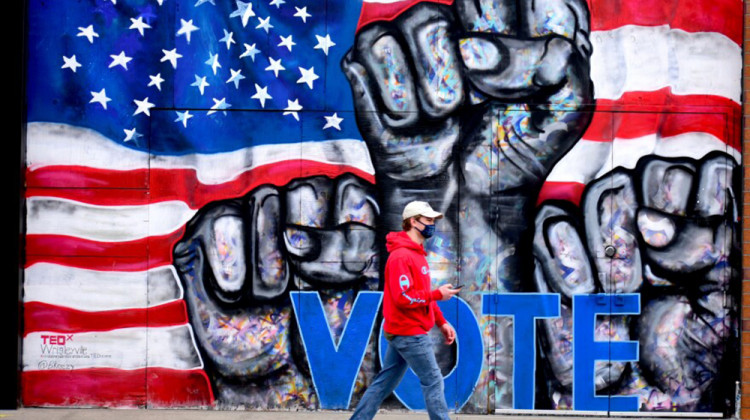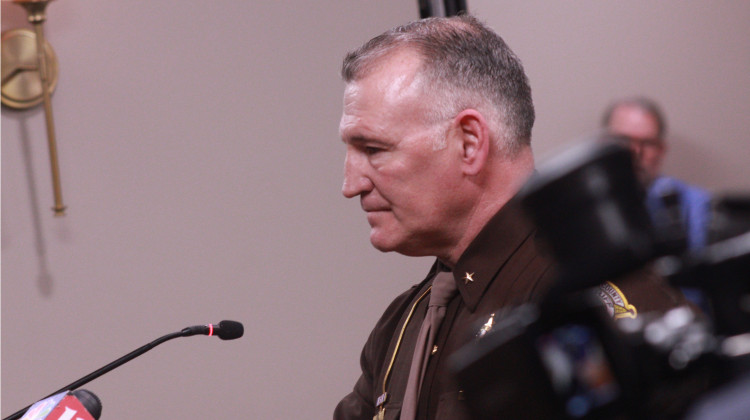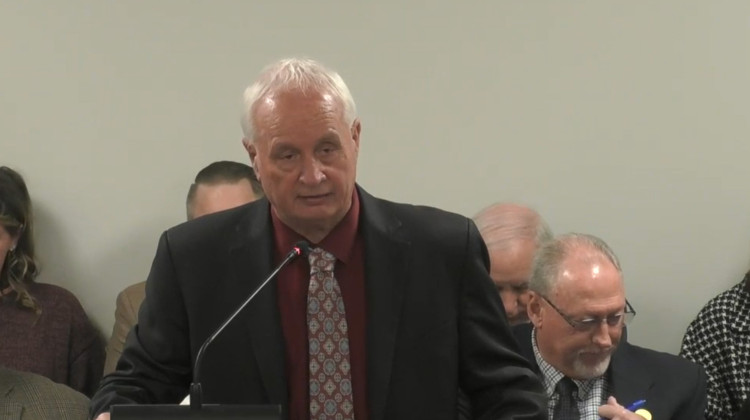
In the last three midterm primary elections, Indiana had less than 25 percent voter turnout.
FILE PHOTO: Justin Hicks/IPB NewsIndiana’s primary election is on May 3, 2022. What do you need on Election Day? Where can you find your ballot to research candidates ahead of time? Does your vote really matter?
We received questions through the Indiana Two-Way, a weekly text group that provides news updates and asks questions to inform our reporting. To join, text the word “Indiana” to 73224.
What do I need on Election Day?
You need a photo ID.
Under Indiana’s 2005 voter ID law, your photo identification must meet four criteria: it must display your photo, your name (though, it doesn’t have to be a perfect match), an expiration date and either be current or have expired sometime after the date of the last General Election, and issued by the state of Indiana or the U.S. government.
There are a handful of photo IDs that fall into those categories. An Indiana driver’s license, a U.S. passport, Indiana State Identification Card, or military ID card all work. And student IDs at Indiana state colleges and universities may also work – as long as they follow the rest of the criteria. However, students at private institutions may not use student IDs for voting.
Join the conversation and sign up for the Indiana Two-Way. Text "Indiana" to 73224. Your comments and questions in response to our weekly text help us find the answers you need on statewide issues.
Who is eligible to vote in Indiana?
There are a few qualifications to vote in Indiana. First and foremost, you must be both a U.S. citizen and a resident of Indiana. Additionally, you must be 18 years old on or before the general election in November – which means 17-year-olds can vote in the primary as long as they’re 18 before Nov. 8, 2022.
People who are currently in prison after being convicted of a crime cannot vote in Indiana. But their voting rights are restored upon release. And you have to have lived in the precinct you’re voting in for at least 30 days before the election.
Finally, you have to be registered to vote.
How do you register to vote?
The easiest way: go to IndianaVoters.com. The Indiana Secretary of State runs the site, and allows you to register to vote, update address information, check your registration and find your polling place on this website.
But you also must have a valid Indiana Driver’s License or Indiana State Identification Card.
You can register to vote in-person or by mail by filling out a voter registration form. Indiana residents can register to vote without a driver’s license or Indiana State Identification Card – but, because of Indiana’s voter ID laws, you’ll have to have a legal identification card issued by the U.S. government or the state of Indiana on Election Day.
Certain military and overseas voters have extended registration deadlines. All that information is available on the Indiana Secretary of State’s website.
Where can I find my ballot? And where can I find information on candidates?
There are lots of places you can go – including candidate websites, local media outlets and even specialty voting guides on issues important to you.
Go to IndianaVoters.com and select “Check my registration.” Once you log into your Voter Portal, scroll to “Who's on the Ballot.”
We’ve compiled a tip sheet for finding more information about the candidates on your ballot to make informed decisions when voting.
Where can I find information on school referendums?
Eight school corporations in Indiana are seeking voter approval for referendum funding this May.
Here’s a calculator to see how these proposed referendums will affect your property taxes.
Lawmakers changed state law in 2021 to require new referendum language on ballots. They now include percentages about a school's average property tax revenue, among other things. That same year, lawmakers also created a requirement for schools to post revenue spending plans so the public can better understand how those dollars would be used.
But school leaders and experts have concerns about new, lengthier language on voters' ballots.
What is being done to increase voter security?
Indiana counties that use electronic voting machines are finally getting enough money from the state to equip all those machines with paper backup systems.
A new state law, HEA 1116, requires counties that use electronic voting machines to, by 2024, install “voter verifiable paper audit trails” – a backup system that lets people check their ballot selections on a paper printout before confirming their vote.
The state will provide funding for every county that needs paper backup systems by July 1. Purchasing those systems will take time, but all should be in place by the 2024 elections.
That is just one of several things the state has done recently to increase voter security.

What rights do I have as a voter?
Short answer: a lot. If you meet the criteria for voting in Indiana, you have the right to fair and free elections.
The Indiana Secretary of State has a one-page document in English and Spanish for who to call if you’re concerned about your voting place. If you feel your rights have been violated or you’re concerned about voter fraud there are a few resources you can contact.
Indiana Secretary of State’s Office
- (866)-IN-1-VOTE (866-461-8683)
- They’ll have staff on hand for phone calls from 6 a.m. to 7 p.m. Eastern.
Indiana Disability Rights
- Voice (317) 722-5555
- Toll Free (800) 622-4845
- Text Telephone (TTY) (800) 838-1131
Indiana Election Division
- Direct (317) 232-3939
- Toll Free (800) 622-4941
Does my vote really matter?
Indiana, like most states, has had several examples where a small amount of votes decided elections.
Especially in midterm elections – when fewer voters cast ballots – showing up can make a bigger difference.

In the last three midterm primary elections, Indiana had less than 25 percent voter turnout.
CORRECTION: A previous version of this story said 17-year-olds could vote in the May primary as long as they were 18 before Nov. 3, 2020. That was incorrect. As long as a voter is 18 before Nov. 8, 2022, they may cast a ballot in the May primary.
Contact Lauren at lchapman@wfyi.org or follow her on Twitter at @laurenechapman_.
Copyright 2022 IPB News. To see more, visit IPB News.9(MDAyMzk1MzA4MDE2MjY3OTY1MjM5ZDJjYQ000))
 DONATE
DONATE






 Support WFYI. We can't do it without you.
Support WFYI. We can't do it without you.